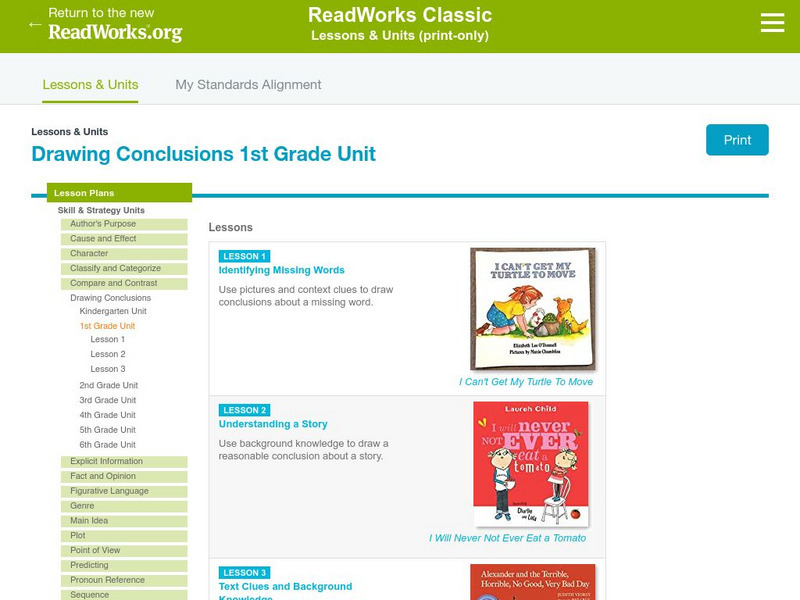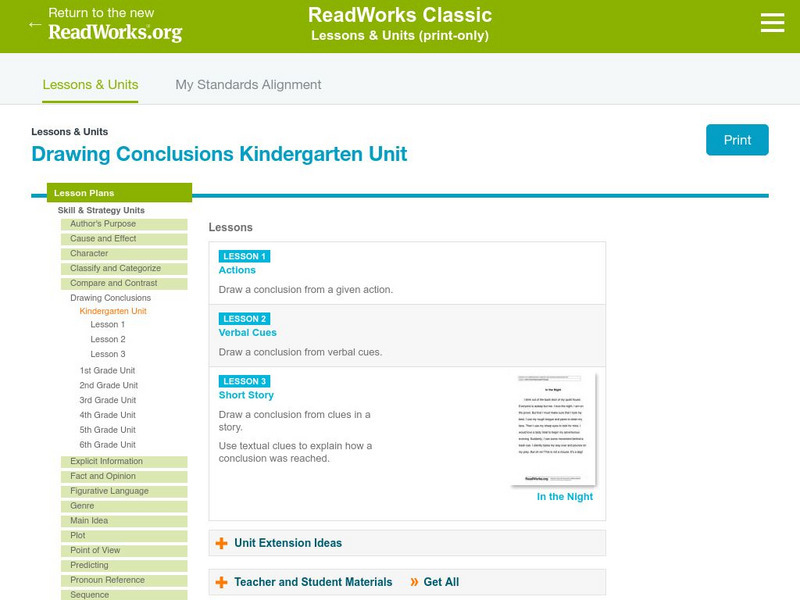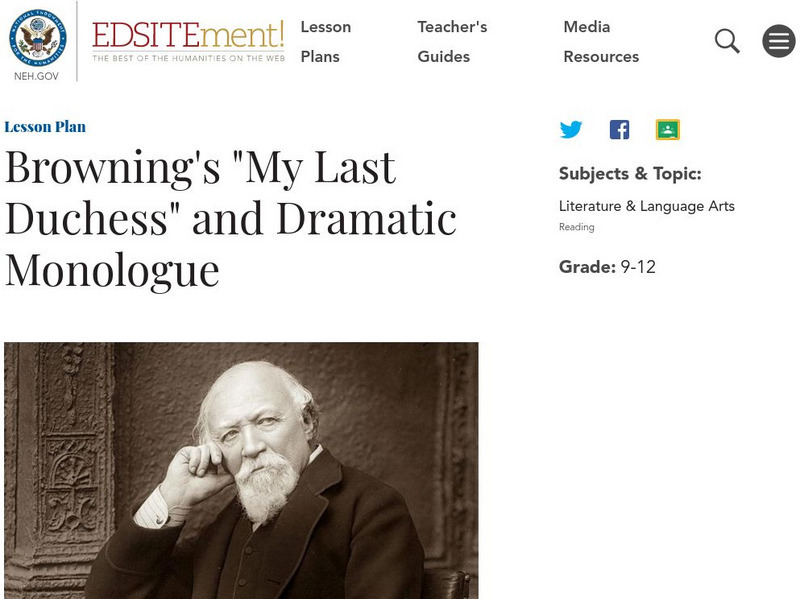Hi, what do you want to do?
Curated OER
Two Column Logic Proofs
Students complete two column proofs. In this geometry instructional activity,students derive the reasons their answers are correct using logic. They write the proof step by step using two columns.
Curated OER
Weather Forecasting: From Then to Now
Eighth graders review the history of weather forecasting. For this earth science lesson, 8th graders identify the different tools used in forecasting weather. They explain why it's important to know the weather.
Curated OER
Using Newsprint as a UV Detector
Students investigate the effects of UV radiation. In this earth science lesson, students explain how the time of day relate to UV abundance on Earth. They determine if weather affects the amount of UV that Earth receives.
Curated OER
A Treasure at our Doorstep
Young scholars write a descriptive essay about a historical landmark in their area, such as the Curtis Center in Philadelphia, PA. In this historical landmarks lesson, students use their senses to detail information about the chosen...
Curated OER
Mississippi’s Electricity: From Generation to Consumption
Eighth graders discover how electricity is produced. In this physics activity, 8th graders infer about the future of Mississippi's energy industry. They participate in a Smart Board interactive activity at the end of the activity.
Curated OER
Mineral Lab
Eighth graders examine the physical properties of different minerals. In this earth science instructional activity, 8th graders explain the uses of minerals in their daily lives. They complete the mineral identification table during the...
Curated OER
How Can You Study Things You Can’t See Like: Atoms?
Young scholars simulate how scientists studied things they can't see like atoms. In this chemistry lesson plan, students predict what is inside the numbered obsertainers. They design a way to investigate what's inside without opening it.
Curated OER
Using PING to determine factors of Internet delay
Learners use the concepts of PING to examine Internet delay. They discuss why PING is used in the Computer Science industry. They practice interpreting data as well.
Curated OER
Cycles Review
Eighth graders discuss the four major cycles of matter. In this general science lesson plan, 8th graders decide which of the four is the most important. They share their opinion in class.
Curated OER
Introduction to Biomes
Eighth graders identify the different kinds of biomes. In this life science instructional activity, 8th graders explain their importance in an ecosystem. They take a BrainPop quiz at the end of the instructional activity..
Curated OER
Investigation of Timbre
Students design an experiment to analyze the timbre of different instruments. In this physics lesson, students analyze the missing quality in sound. They discuss their results in class.
Curated OER
Ecology: Adaptations
Eighth graders identify different types of adaptation in organisms. In this biology lesson, 8th graders explain how adaptation help organisms survive. They complete a worksheet at the end of the lesson.
Other
Pennsylvania Doe: Lesson Plan: Making Inferences and Drawing Conclusions
In this lesson the teacher uses modeling and questioning strategies to walk students through making inferences in various texts and then using those inferences to draw conclusions.
Read Works
Read Works: Fourth Grade: One Lesson Unit: Drawing Conclusions
[Free Registration/Login Required] Students are guided through a lesson to understand the difference between explicit information and conclusions drawn from a text. With free login, users have access to passages used in this lesson.
PBS
Pbs Learning Media: Teacher's Guide: Xavier Riddle and the Secret Museum
Use this teacher's guide to plan how you'll integrate video clips, biosketch readers, and graphic organizers for Xavier Riddle and the Secret Museum across your Grade 1-2 classroom curricula. From guided reading to a living wax museum,...
National Endowment for the Humanities
Neh: Edsit Ement: Animal Farm: Allegory and the Art of Persuasion
This lesson plan will introduce students to the concept of allegory by using George Orwell's widely read novella, Animal Farm. Through this novel, students will learn what an allegory is, the rhetorical components of an allegory, and...
Read Works
Read Works: Drawing Conclusions 3rd Grade Unit
[Free Registration/Login Required] A two-lesson unit on drawing conclusions through which students learn how to recognize the difference between implicit information and drawing conclusions. Students also learn to draw conclusions in...
Read Works
Read Works: Drawing Conclusions 1st Grade Unit
[Free Registration/Login Required] A three-lesson unit on drawing conclusions through which students learn how to use pictures and context clues to discover a missing word and to draw conclusions about a story. Students also use...
Read Works
Read Works: Drawing Conclusions Kindergarten Unit: Short Story
[Free Registration/Login Required] A lesson plan teaching students to make conclusions based on a sentences and short texts. Students use textual cues to explain how the conclusions were reached. Ideas for direct teaching, guided...
National Endowment for the Humanities
Neh: Edsit Ement: Fable and Trickster Tales Around the World
The lessons presented in this website "introduce children to folk tales" and how these folktales are changed and affected by generational and cultural values. Includes several links to further related information on folktales, fables,...
Better Lesson
Better Lesson: What the Heck Is That? Inferring the Purpose of an Object
In this lesson, 5th graders use their prior knowledge and inference skills to determine uses of unfamiliar objects. They participate in group discussions and analyze the key information they have in order to reach conclusions.
Read Works
Read Works: Kindergarten: Three Lesson Unit: Drawing Conclusions
[Free Registration/Login Required] Three lessons designed to introduce young learners and beginning readers to the concept of drawing conclusions based on actions performed in a charades game, on verbal cues given in a guessing game, and...
National Endowment for the Humanities
Neh: Edsit Ement: Browning's "My Last Duchess" and Dramatic Monologue
Reading Robert Browning's poem "My Last Duchess," students will explore the use of dramatic monologue as a poetic form, where the speaker often reveals far more than intended. The students will later write their own dramatic monologue...
National Endowment for the Humanities
Neh: Edsit Ement: Esperanza Rising: Learning Not to Be Afraid to Start Over
In this lesson students will explore some of the contrasts that Esperanza experiences when she suddenly is forced to leave the life of a wealthy landowner's daughter surrounded by servants to become a servant herself among an extended...




























